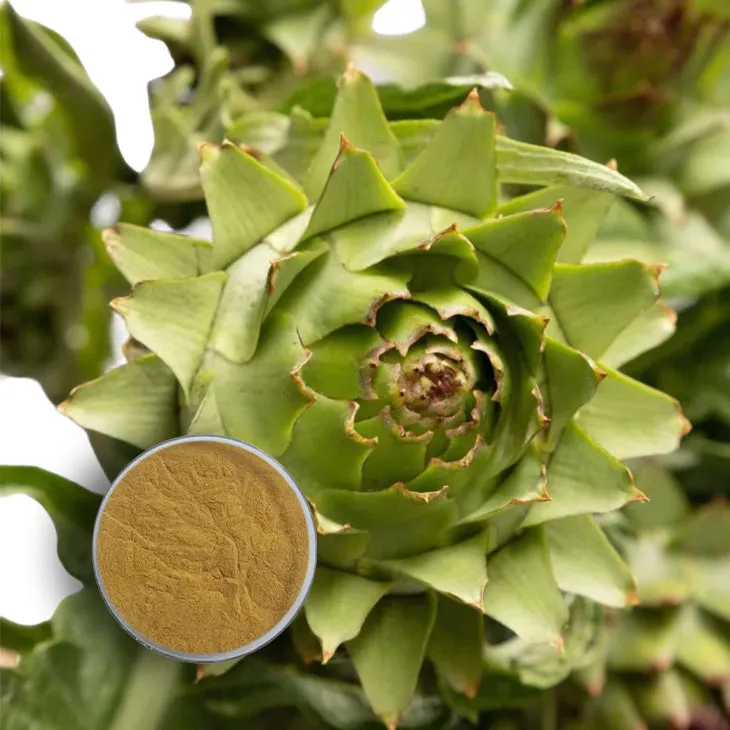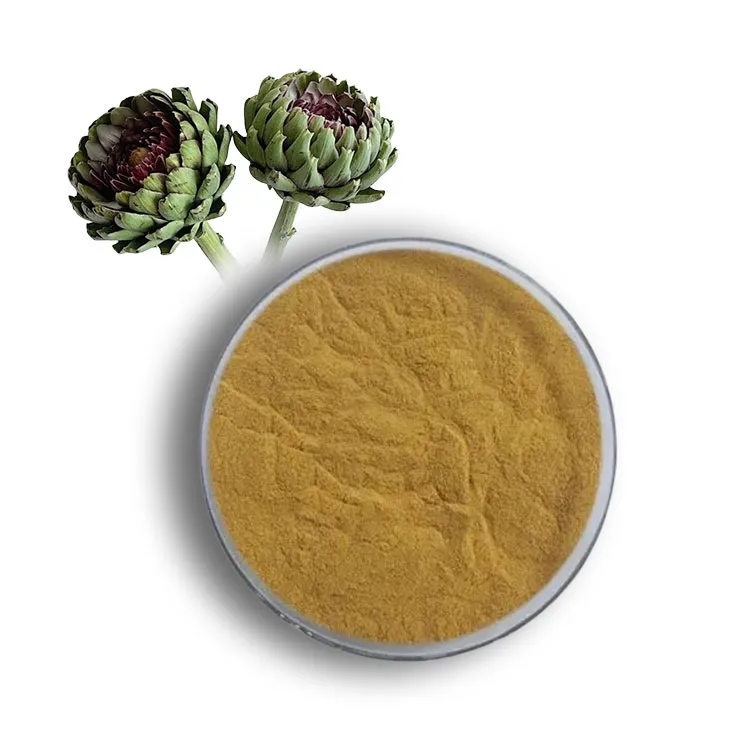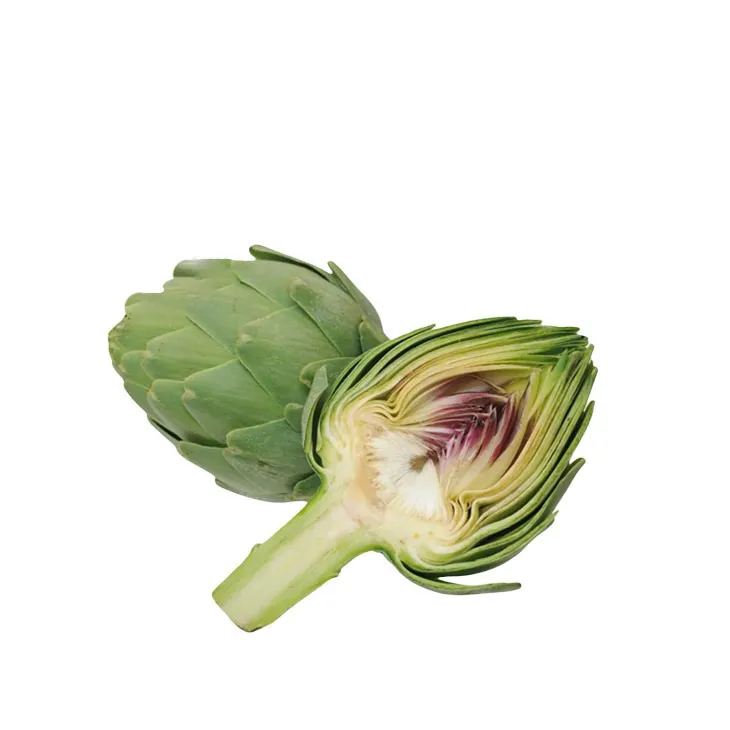- 0086-571-85302990
- sales@greenskybio.com
10 Kinds of Artichoke Leaf Extracts That Are Helpful for Improving Health.
2024-12-10

Introduction
Artichoke, a unique and versatile plant, has been recognized for its potential health benefits for centuries. The Artichoke Leaf Extracts are particularly interesting as they contain a variety of bioactive compounds. In this article, we will explore ten different types of Artichoke Leaf Extracts and their contributions to improving health.

1. Cynarin - A Prominent Antioxidant
Cynarin is one of the most well - known Artichoke Leaf Extracts. It is a phenolic compound that has strong antioxidant properties. Antioxidants play a crucial role in the body by protecting cells from damage caused by free radicals. Free radicals are unstable molecules that can cause oxidative stress, which is linked to various chronic diseases such as heart disease, cancer, and neurodegenerative disorders.
Studies have shown that cynarin can help to scavenge free radicals in the body. This not only helps to prevent cell damage but also may contribute to the overall anti - aging process. Additionally, cynarin has been shown to have a positive impact on cholesterol levels. It may help to reduce LDL (low - density lipoprotein) cholesterol, which is often referred to as "bad" cholesterol, while maintaining or even increasing HDL (high - density lipoprotein) cholesterol, the "good" cholesterol.

2. Chlorogenic Acid - For Digestive Health
Chlorogenic acid, another important artichoke leaf extract, has significant implications for digestive health. It is a type of polyphenol that is found in many plants, including artichokes.
One of the main ways chlorogenic acid benefits digestion is through its role in promoting the growth of beneficial gut bacteria. A healthy gut microbiome is essential for proper digestion, nutrient absorption, and overall immune function. Chlorogenic acid acts as a prebiotic, providing nourishment for these beneficial bacteria, such as bifidobacteria and lactobacilli.
Moreover, chlorogenic acid may also help to relieve digestive discomfort. It has been shown to have anti - inflammatory properties in the digestive tract, which can be beneficial for those suffering from conditions such as irritable bowel syndrome (IBS) or gastritis. By reducing inflammation, it can ease symptoms such as abdominal pain, bloating, and diarrhea.

3. Luteolin - Protecting the Liver
Luteolin is an extract from artichoke leaves that has a particular affinity for the liver. The liver is a vital organ responsible for numerous functions, including detoxification, metabolism of nutrients, and production of bile.
Luteolin has been shown to have hepatoprotective properties. It can protect the liver from damage caused by toxins, such as alcohol and certain drugs. In studies, luteolin has been found to reduce liver inflammation and oxidative stress, which are common factors in liver diseases such as hepatitis and fatty liver disease.
Furthermore, luteolin may also play a role in enhancing liver function. It can help to improve the liver's ability to metabolize fats, which is important for maintaining a healthy weight and preventing the development of fatty liver. By promoting liver health, luteolin can contribute to overall well - being.
4. Silymarin - A Synergistic Effect
Although silymarin is more commonly associated with milk thistle, it can also be found in artichoke leaf extracts. Silymarin is a complex of flavonolignans that has been widely studied for its liver - protecting effects.
When combined with other artichoke leaf extracts, silymarin can have a synergistic effect on liver health. It works by enhancing the liver's antioxidant defenses and promoting the regeneration of liver cells. This can be especially beneficial for individuals with liver damage or those at risk of liver diseases.
Moreover, silymarin may also have anti - cancer properties, particularly in relation to liver cancer. It can inhibit the growth and spread of cancer cells in the liver, although more research is needed to fully understand its mechanisms and potential applications in cancer treatment.
5. Apigenin - Anti - Inflammatory and Anti - Cancer Potential
Apigenin is a flavonoid present in artichoke leaf extracts. It has drawn attention for its anti - inflammatory and potential anti - cancer properties.
As an anti - inflammatory agent, apigenin can help to reduce inflammation throughout the body. Chronic inflammation is associated with many diseases, including arthritis, heart disease, and diabetes. By suppressing inflammatory pathways, apigenin may help to prevent or manage these conditions.
In terms of its anti - cancer potential, apigenin has been shown to have an inhibitory effect on the growth of various cancer cells in vitro. It can induce apoptosis (programmed cell death) in cancer cells, which is a key mechanism in cancer treatment. However, more in - vivo studies are required to determine its effectiveness and safety as a cancer treatment.
6. Quercetin - Boosting the Immune System
Quercetin is a common flavonoid found in artichoke leaves as well as in many other fruits and vegetables. It is known for its ability to boost the immune system.
Quercetin has immunomodulatory properties, which means it can help to regulate the immune response. It can enhance the activity of immune cells such as macrophages and lymphocytes, which are responsible for fighting off infections. Additionally, quercetin has antioxidant properties that can protect immune cells from oxidative damage, ensuring their optimal function.
During times of illness or stress, the body's immune system may be weakened. Incorporating artichoke leaf extracts containing quercetin into the diet can be a natural way to support the immune system and help the body recover more quickly.
7. Rutin - Strengthening Blood Vessels
Rutin is an extract from artichoke leaves that has beneficial effects on blood vessels. It belongs to the flavonoid family and is known for its role in maintaining the integrity and strength of blood vessels.
Rutin can help to strengthen the walls of blood vessels by promoting the synthesis of collagen, a protein that provides structural support. This can reduce the risk of blood vessel damage and conditions such as aneurysms and varicose veins.
Furthermore, rutin has antioxidant and anti - inflammatory properties that can protect blood vessels from oxidative stress and inflammation. This is important for preventing the development of cardiovascular diseases, as damaged blood vessels are a major factor in conditions such as atherosclerosis and heart attacks.
8. Ferulic Acid - Skin Health and Anti - Aging
Ferulic acid found in artichoke leaf extracts has implications for skin health and anti - aging. It is a phenolic compound that is also present in many other natural sources, such as grains and fruits.
When applied topically, ferulic acid can protect the skin from damage caused by ultraviolet (UV) radiation. It can also help to reduce the formation of wrinkles and fine lines by promoting collagen synthesis in the skin. Collagen is essential for maintaining skin elasticity and firmness.
Internally, ferulic acid's antioxidant properties can help to protect the skin from oxidative damage at the cellular level. This can contribute to a more youthful appearance and healthier skin overall. Incorporating artichoke leaf extracts rich in ferulic acid into the diet or using skincare products containing this compound can be beneficial for skin health.
9. Caffeoylquinic Acids - Anti - Diabetic Properties
Caffeoylquinic acids (CQAs) are a group of compounds found in artichoke leaf extracts. They have shown promise in relation to anti - diabetic properties.
Studies have suggested that CQAs can help to regulate blood sugar levels. They can inhibit certain enzymes involved in carbohydrate digestion, which can slow down the absorption of glucose from the digestive tract. This can prevent rapid spikes in blood sugar levels, which are harmful for individuals with diabetes.
Furthermore, CQAs may also improve insulin sensitivity. Insulin is a hormone that is essential for regulating blood sugar levels. By increasing insulin sensitivity, the body can use insulin more effectively to transport glucose into cells, where it can be used for energy. This can be beneficial for both type 1 and type 2 diabetes patients.
10. Diosmetin - Cardiovascular Health
Diosmetin is an artichoke leaf extract that has been associated with cardiovascular health. It is a flavonoid that can have a positive impact on the heart and blood vessels.
Diosmetin can help to reduce blood pressure by relaxing the smooth muscles in blood vessel walls. High blood pressure is a major risk factor for cardiovascular diseases such as heart attacks and strokes. By reducing blood pressure, diosmetin can lower the risk of these conditions.
Additionally, diosmetin has antioxidant properties that can protect the heart and blood vessels from oxidative damage. It can also reduce inflammation in the cardiovascular system, which is another important factor in maintaining heart health.
How to Incorporate Artichoke Leaf Extracts into a Healthy Lifestyle
Now that we have explored the various health benefits of artichoke leaf extracts, the next question is how to incorporate them into a healthy lifestyle.
Dietary Supplements
One of the easiest ways to obtain artichoke leaf extracts is through dietary supplements. These are available in various forms, such as capsules, tablets, and tinctures. When choosing a supplement, it is important to look for a high - quality product from a reputable manufacturer. Check the label for the specific extracts and their concentrations to ensure that you are getting the desired benefits.
Food Sources
Of course, the best way to get the benefits of artichoke leaf extracts is through natural food sources. Artichokes themselves are a great option. They can be cooked and eaten in a variety of ways, such as steamed, roasted, or in salads. However, it should be noted that cooking methods can affect the concentration of the extracts. For example, steaming may preserve more of the beneficial compounds compared to boiling.
Another option is to look for artichoke - based products, such as artichoke - flavored spreads or artichoke - infused oils. These can add a unique flavor to your meals while also providing some of the health benefits of the leaf extracts.
Conclusion
Artichoke leaf extracts offer a wide range of health benefits, from antioxidant and anti - inflammatory effects to specific benefits for digestion, liver function, and more. By understanding the different types of extracts and their properties, we can make informed decisions about how to incorporate artichoke leaf extracts into our daily lives for overall well - being.
FAQ:
What are the antioxidant properties of artichoke leaf extracts?
Artichoke leaf extracts contain various compounds such as flavonoids and phenolic acids that contribute to their antioxidant properties. These antioxidants can neutralize free radicals in the body. Free radicals are unstable molecules that can cause damage to cells, DNA, and proteins. By scavenging free radicals, artichoke leaf extracts may help reduce the risk of chronic diseases associated with oxidative stress, like heart disease and certain cancers.
How do artichoke leaf extracts impact digestion?
Artichoke leaf extracts can have a positive impact on digestion. They may stimulate the production of bile in the liver, which is then secreted into the small intestine. Bile helps in the emulsification and digestion of fats. Additionally, these extracts may also have a mild laxative effect, promoting regular bowel movements and helping to prevent constipation. Some components in artichoke leaf extracts may also soothe the digestive tract, reducing symptoms such as bloating and indigestion.
Can artichoke leaf extracts really support liver function?
Yes, artichoke leaf extracts can support liver function. The extracts may help in the detoxification process of the liver. They can enhance the liver's ability to metabolize toxins and drugs, making it easier for the body to eliminate harmful substances. Moreover, as mentioned before, by promoting bile production, they also assist in the proper functioning of the liver as bile is crucial for the digestion and absorption of fats and the excretion of waste products from the liver.
How can one incorporate artichoke leaf extracts into a healthy lifestyle?
There are several ways to incorporate artichoke leaf extracts into a healthy lifestyle. One option is to take them as dietary supplements, which are available in various forms such as capsules or tablets. However, it is important to follow the recommended dosage. Another way is to consume artichokes directly in the diet. Artichokes can be prepared in many ways, like steaming or boiling, and added to salads or main dishes. Artichoke - based teas are also a popular choice for those who want to enjoy the benefits of artichoke leaf extracts in a beverage form.
Are there any side effects of artichoke leaf extracts?
While artichoke leaf extracts are generally considered safe for most people, some individuals may experience side effects. These can include mild gastrointestinal issues such as nausea, abdominal pain, or diarrhea, especially when consumed in large amounts. People who are allergic to artichokes or related plants may also have an allergic reaction to the extracts. Pregnant or breastfeeding women should consult a healthcare provider before using artichoke leaf extracts as their safety in these situations has not been fully established.
Related literature
- The Health Benefits of Artichoke Leaf Extracts: A Comprehensive Review"
- "Antioxidant and Digestive - Promoting Effects of Artichoke Leaf Extracts"
- "Artichoke Leaf Extracts and Liver Health: Current Research Findings"
- ▶ Hesperidin
- ▶ citrus bioflavonoids
- ▶ plant extract
- ▶ lycopene
- ▶ Diosmin
- ▶ Grape seed extract
- ▶ Sea buckthorn Juice Powder
- ▶ Beetroot powder
- ▶ Hops Extract
- ▶ Artichoke Extract
- ▶ Reishi mushroom extract
- ▶ Astaxanthin
- ▶ Green Tea Extract
- ▶ Curcumin Extract
- ▶ Horse Chestnut Extract
- ▶ Other Problems
- ▶ Boswellia Serrata Extract
- ▶ Resveratrol Extract
- ▶ Marigold Extract
- ▶ Grape Leaf Extract
- ▶ blog3
- ▶ blog4
- ▶ blog5
-
Pure 85% Tomentil Extract.
2024-12-10
-
Phellodendron Extract
2024-12-10
-
Polygonum multiflorum extract
2024-12-10
-
Artichoke Extract
2024-12-10
-
Kelp Extract Powder
2024-12-10
-
Cocoa Extract
2024-12-10
-
Nettle leaf extract
2024-12-10
-
Uridine-5'-monophosphate Disodium salt
2024-12-10
-
Curcumin Extract
2024-12-10
-
Gynostemma pentaphyllum extract
2024-12-10
-
Grape Leaf Extract
2024-12-10





















